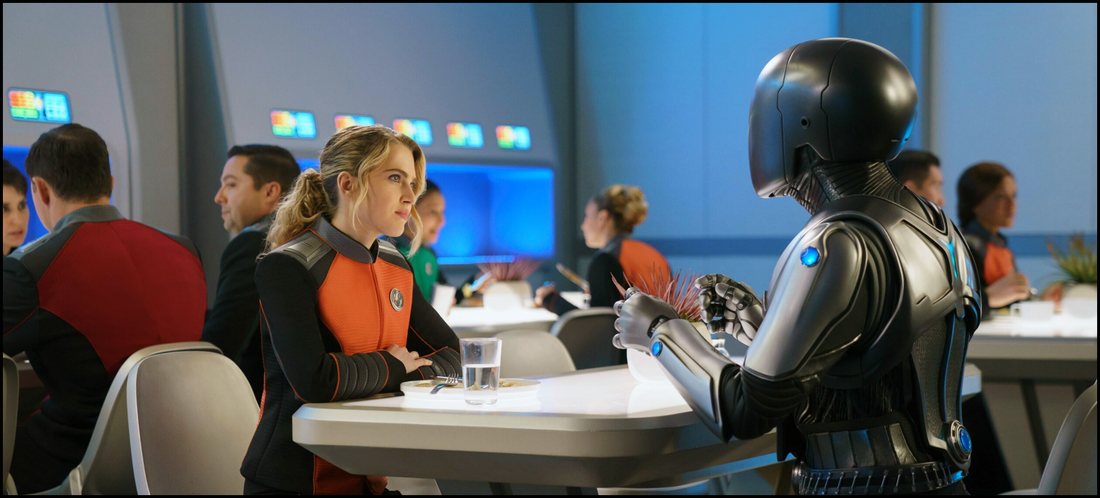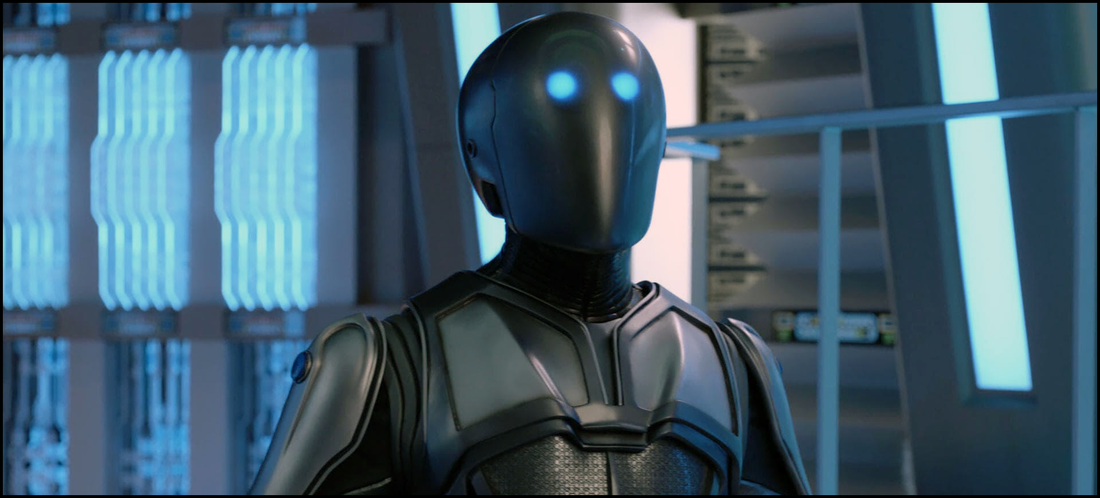I’m on vacation, and the BnB I’m staying at has a Hulu account. I don’t have one – generally speaking, I’m not a fan of paywalls, though I have broken down on a few fronts – so imagine my surprise when I was afforded this opportunity to watch an episode or two of The Orville: New Horizons as a bonus perk? I’ve always intended to put up some episode reviews for the popular Seth MacFarlane program – bought the first two seasons on DVD intending to do so – but how about stumbling into the chance to start with Season 03’s premiere installment?
Sigh.
I’ve mentioned in this space that I’m not a big fan of Seth’s trademark humor. It isn’t awful; I just find the vast majority of it a bit easy, occasionally a bit lazy, and every now and then a bit uninspired. While it isn’t always predictable, it possesses elements some might see coming more than a mile down the road. Think what you will, but my position is cheap comedy doesn’t do Science Fiction or Fantasy any favors.
Thankfully, Seth and friends have largely dialed it back so far as The Orville is concerned. There’s a barb here and there, but much of it in this episode is far more casual and less structured than what’s come before. Heck, even a few of the asides pass so quickly some viewers might not even notice them. I could argue that – since they’re no longer the focus of attention – then why bother with them? Sticking with the ‘MacFarlane signature appeal’ only for the sake of maintaining that connection to his other properties is a benign way of throwing a creator a bone (as they say); but I – for one (and I realize I’m alone) – am glad it’s been mildly refocused.
However, “Electric Sheep” – the first episode of this new season – still felt clunky, much of which is owed to its curious design.
For the bulk of the hour-plus, the ship sits in dry dock, undergoing a full refit now that it’s been moved to Hulu (and, yes, also accounting for the huge conflict that the program dealt with with the Kaylon). As a result, there are sequences and scenes crafted around this construction, essentially tying the show even closer to Star Trek: The Next Generation’s famed ‘technobabble’ than ever before. Yes, yes, yes: I realize these are small bits that some believe help ‘set the mood’ of a show that’s grounded in SciFi … my point is that they don’t feel organic. They feel staged. As a consequence, staged bits slow down the narrative, and I’d question whether or not that’s the best use of any show’s time, especially The Orville, whose morality plays don’t embrace the hard scifi subjects that TNG did (thus far).
Also, what does it truly say about a show when its best special effects stuff is part and parcel of a dream sequence?
In any event, much like The Orville episodes on Fox, this adventure was another cerebral exercise for morality purists: it deals chiefly with suicide as the ship finds itself in the precarious situation of having to say goodbye to one of its finest characters (and its most Trek derivative), Isaac. In a move to increase ship’s efficiency, the android electronically fries his brain, thus killing himself as a way to push the crew past their obvious reservations about serving alongside a member of a race responsible for killing so many who served in the Planetary Union.
As the episode’s primary story, this doesn’t truly allow for much action. As I’ve implied, this presents a moral quandary – along with the clear emotional tie-ins – and it requires a wealth of talking amongst the characters to explore this ‘strange new predicament.’ The chief catalyst for much of the moral quandary involves an all-new cast member – actress Anne Winters enlists in the role of Ensign Charly Burke, who I’m (ahem) affectionately going to refer to as ‘Ensign Snotty.’ (Yes, you can infer from that I didn’t much care for her.) Her personal experience in the Kaylon massacre has left her with an understandable grudge against Isaac … and, lo and behold, it’s also her personal skill set that makes her the only person in all of the galaxy who can bring the fallen crewmate back from the dead.
While others might find that particularly intriguing, I thought it was a bit too formulaic for these dire circumstances. It’s the kind of thing that’s been done before elsewhere (in Science Fiction and Fantasy). MacFarlane’s script tries hard to give it some kind of greater dramatic weight, but substantive moments delivered from an unlikeable character don’t always ring authentically, not in the moment. It’s a sequence that’ll likely be followed up upon in a later episode, so as a standalone instant I didn’t make too much of it. I suspect we’ll see more of Ensign Snotty, and then we’ll be able to gauge whether or not she’s taken steps forward as a new addition to the team.
Otherwise, “Electric Sheep” still felt uneven.
Many of show’s characters are sidelined into small moments, and even a few barely capture seconds of screen time. Bortus – a staple for so many of the show’s better episodes – is reduced to a mere bridge officer, and here’s hoping the player gets some exposure in the next hour. Also, there’s a surplus of time around the show’s addition of a new fighter-craft, giving The Orville more of a ‘Star Wars’ trait than was ever a ‘Star Trek’ one. Also, this new ship – the Pteradon – doesn’t even figure into the episode’s main plot in any substantive way, giving its sequences a feeling of gratuitousness that The Orville has never had in the past.
Is this the ‘New Horizons’ hinted at in the program’s title?
If it is, then maybe it’s better behind a paywall where gamers and their friends come together.
Though I’ve never been The Orville’s biggest fan, I appreciated the earnestness put into legitimate storytelling, ignoring the temptation to the ‘flash and sizzle’ that all too easily takes over visually in favor of spinning real yarn. “Electric Sheep” felt like it was more of an appeal to “electric sheep” – a term I’ve heard applied to those who live in online games as opposed to reality – and I’m not sure that’s the connotation intended.
Only time will tell.
-- EZ



 RSS Feed
RSS Feed